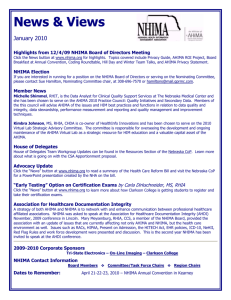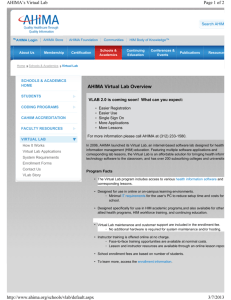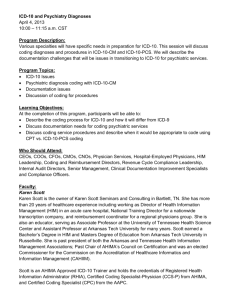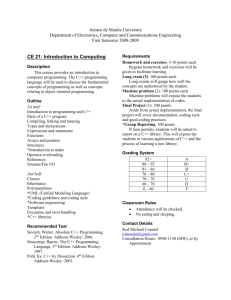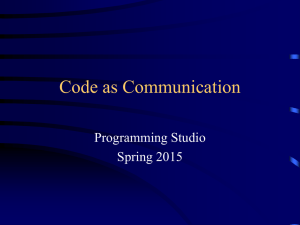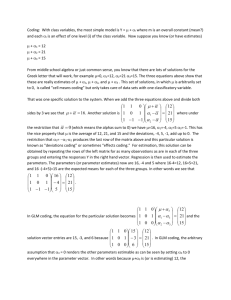Professional Certificate Approval Program (PCAP) Manual
advertisement
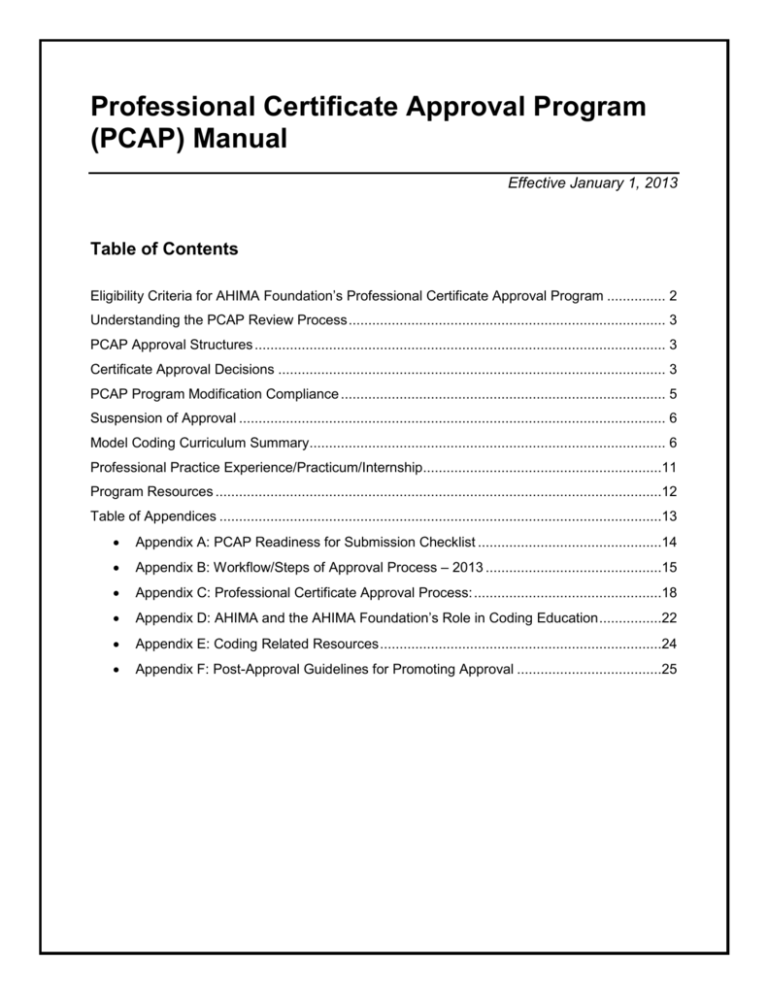
Professional Certificate Approval Program (PCAP) Manual Effective January 1, 2013 Table of Contents Eligibility Criteria for AHIMA Foundation’s Professional Certificate Approval Program ............... 2 Understanding the PCAP Review Process ................................................................................. 3 PCAP Approval Structures ......................................................................................................... 3 Certificate Approval Decisions ................................................................................................... 3 PCAP Program Modification Compliance ................................................................................... 5 Suspension of Approval ............................................................................................................. 6 Model Coding Curriculum Summary........................................................................................... 6 Professional Practice Experience/Practicum/Internship.............................................................11 Program Resources ..................................................................................................................12 Table of Appendices .................................................................................................................13 Appendix A: PCAP Readiness for Submission Checklist ...............................................14 Appendix B: Workflow/Steps of Approval Process – 2013 .............................................15 Appendix C: Professional Certificate Approval Process: ................................................18 Appendix D: AHIMA and the AHIMA Foundation’s Role in Coding Education ................22 Appendix E: Coding Related Resources ........................................................................24 Appendix F: Post-Approval Guidelines for Promoting Approval .....................................25 Eligibility Criteria for AHIMA Foundation’s Professional Certificate Approval Program A program is eligible to apply for approval ONLY if: The sponsoring institution has had students enrolled in the certificate program for a minimum of six months; AND The sponsoring institution is accredited by a regional accrediting agency recognized by the U.S. Department of Education (USDE), OR The sponsoring institution is accredited by a national accreditor with USDE provisions, OR The sponsoring institution is a hospital-based program working collaboratively with an institution that meets the previously listed eligibility criteria. There are no exceptions to these qualifying criteria. Professional Certificate Approval Program Manual AHIMA Foundation © 2013 2 PROFESSIONAL CERTIFICATE APPROVAL PROGRAM MANUAL This manual, together with the standards outlined in the accompanying Self-Study Template, provide institutions seeking approval of their coding certificate programs with all necessary information to complete the approval process. At a high level, the process requires completion of a detailed self-study template and submission of an application fee. Following the submission of these items, the PCAP review team will review materials and make a recommendation for approval or denial to the PCAP Council that will make the final determination. A detailed summary of the steps in the process appears later in this manual. Understanding the PCAP Review Process PCAP Approval Structures: The PCAP process is supported by the PCAP Review Team, Approval Council, and the PCAP Commission. The purpose of these supporting bodies is to ensure program quality and objective assessment of coding programs applying for approval under the PCAP. The PCAP Review Team is composed of the individuals that review the program selfstudy documentation and make recommendations to the PCAP Approval Council regarding program approval. PCAP reviewers are AHIMA members holding a qualifying professional credential (RHIA, RHIT, CCS, or CCS-P). Reviewers are cleared of any potential conflicts prior to conducting a program review. The PCAP Approval Council is composed of AHIMA members holding a qualifying credential. The PCAP Approval Council is the body that makes decisions regarding a program’s approval status based on recommendations from the PCAP reviewers. PCAP Approval Council members are cleared of any potential conflicts prior to participating in any program approval decisions. The PCAP Commission is a sub-team of the AHIMA Foundation Board of Directors. The Commissioners are AHIMA members and they approve PCAP policies and procedures. In addition, the PCAP Commission serves as the appeal body to the PCAP process. Certificate Approval Decisions When determining approval decisions, the PCAP Review Team/Council will state that a program’s compliance is “met” or “not met” based on the Approval Criteria for Certificate Programs. The assessment report will be provided to the program after completion of the process. The three categories of approval decisions are: Approved, Conditionally Approved, or Denial of Approval. Professional Certificate Approval Program Manual AHIMA Foundation © 2013 3 Approved – no further action is needed, the program has passed the review and can include the phrase “AHIMA Foundation Approved” in all marketing literature and can display the Annual Approval Seal on their website and other materials. AHIMA Foundation staff liaison provides electronic “approval seal” logo that is effective for one year from the time of approval. AHIMA Foundation staff liaison adds the institution’s name to the Professional Certificate Approved Program webpage. Note: Students enrolled in Certificate Programs seeking approval are eligible for AHIMA Student Membership only after program approval has been conferred. Conditionally Approved – the program has some areas that need to be revisited, but the PCAP has determined that these areas can be resolved within a 1 month timeframe. The program must address the areas and provide additional supporting information to resolve the noted conditions within 1 month. Failure to comply will result in an automatic Denial of Approval status meaning that the program must wait 6 months before reapplying. AHIMA Foundation staff liaison notifies school of decision and outlines required response to conditions. Institution submits requested revision/response to AHIMA Foundation staff liaison (within one month of notification of conditional approval) AHIMA Foundation staff liaison forwards revision/response to Council members prior to next regularly scheduled meeting. Council votes to either approve or deny approval. Note: Partial submissions are not permitted. All conditions must be addressed or the plan for addressing the concerns documented in the response to the conditional approval. Programs that are Conditionally Approved may NOT display the AHIMA Foundation approval seal or announce they are approved until Approval (full approval, not conditional approval) is received. Denial of Approval – the program did not satisfy approval criteria, the nature of the problem areas are substantial and may require 6 months or longer to resolve. Typically, these cases require restructuring of a current course, or creating a new course which will need to pass the program’s internal review process before submitting again to the PCAP. Institutions that are denied approval may resubmit for approval no earlier than one year following notification of denial, unless the PCAP has voted to shorten the time frame. Institutions wishing to re-apply must complete the entire process and pay all associated fees at the time of re-application; however, programs that re-apply within the identified 12 month period will pay a reduced (50%) application fee. Professional Certificate Approval Program Manual AHIMA Foundation © 2013 4 Note: When the creation of a new course is required, the course does not have to be taught in order to satisfy the condition, but the new program must be approved by the curriculum review committee (internal document as evidence) and an expected date of first offering outlined in the materials. Voluntary Withdrawal of Approval -- The PCAP accepts this action at the sponsoring institution’s request. The program's name is removed from the list of approved programs. Annual Attestation -- Annual attestation is required to maintain approved status. The annual attestation process is intended to monitor ongoing program quality. The annual attestation form and requirements are located on the AHIMA Foundation website along with all other PCAP materials. Renewal of Approval -- A program’s approval period is for 3 years (with the renewal activity starting no later than six months prior to the end of the third year of approval) and will expire at the end of the term unless the program re-applies for approval in a timely manner. Programs that do not complete the full review process by their assigned deadline (at the conclusion of their third year of approval) are no longer approved and will be removed from the Directory of Approved Coding Programs. Websites will be audited for removal of all AHIMA Foundation Approval references (including approval seal) Programs that continue to advertise as being AHIMA Foundation approved are in violation of the PCAP and will be contacted by the AHIMA legal department. Note: AHIMA Foundation PCAP Staff Liaison must be notified within thirty days of a change in program or institutional sponsor leadership. AHIMA Foundation will send Notifications of Renewal of Approval with applications, preparation materials and dates for submission to leadership of record. Changes in leadership that were not communicated to the AHIMA Foundation are no excuse for failure to act on renewal activity. Check the accuracy of your program contact data at: http://www.ahimafoundation.org/education/PCAP.aspx find your program and see if name, email, and phone of contact is accurate. This is the individual who will receive the renewal notice and packet. PCAP Program Modification Compliance The AHIMA Foundation reserves the right to make annual PCAP modifications as necessary. Changes that are deemed significant by the AHIMA Foundation may require currently approved programs to make modifications to their existing programs in order to retain approval. The AHIMA Foundation will provide adequate notice and corresponding timeline requirements to allow approved programs to respond to requirements with an implementation plan at the next scheduled annual attestation period. Professional Certificate Approval Program Manual AHIMA Foundation © 2013 5 Suspension of Approval The PCAP has the authority to suspend approval for programs that fail to submit an annual attestation, or whose annual attestation reveals significant deficiencies, lack of response to student complaints, or changes in program status, or that fail to implement required PCAP modifications in a timely manner. While on suspension, institutions must remove approval language from their website, marketing and other program materials. PCAP Self-Study Template Completion Please read this information before completing the self-study template. The institution offering instruction for professional certificates (academic institution, healthcare institutions, private companies, etc.) must ensure that it is compliant in all standards required for approval by the PCAP. The self-study template includes specific instructions for documentation necessary to meet the standards for approval. In addition to the self-study template, approved coding certificate programs must follow the model coding curriculum which requires (at a minimum) that the following curricular requirements are met. Model Coding Curriculum Summary Course Name/Content Medical Terminology Anatomy & Physiology Pathopharmacology (Separate pathology and pharmacology courses may be used as long as the total minimum contact hours are met) ICD Coding – Part 1 ICD Coding – Part 2 CPT Coding – Part 1 CPT Coding – Part 2 Professional Practice Experience Health Information and Delivery Systems (Health Record and Data Content, and IT) Reimbursement Legal and Compliance **Contact Hours** (Minimum) 45 45 45 Individual/ Homework Hours 90 90 90 45 45 45 45 45 with at least 40 hours of authentic coding 45 90 90 90 90 80 45 45 90 90 90 **Contact hours** are based on the Carnegie unit, but are further modified to address online and hybrid delivery models. The Carnegie unit defines a number of clock hours for instruction and the number of individual/homework hours. There is a 2:1 ratio of Professional Certificate Approval Program Manual AHIMA Foundation © 2013 6 contact hours to individual/homework hours with two hours of time spent individually by each student for every contact hour. To verify appropriate contact hours for hybrid or online programs, PCAP Reviewers must be provided with access to the LMS for a class currently in session at the time of the review. Baseline LMS training must also be provided to ensure Reviewers can appropriately evaluate contact hours. The purpose of the contact hour evaluation is to ensure all students have access to appropriate meaningful interaction with the faculty and course support staff. Some methods to demonstrate contact hour compliance include course calendar that shows face to face or synchronous meeting dates/times; documentation of office hour policies and calendars; calendars showing prescheduled chat sessions, etc. The Model Coding Curriculum The Model Coding Curriculum Checklist is included in the Self-Study Template and must be completed as part of the self-study process. The model coding curriculum is steeped in the philosophy of health information management. The current version of the Curriculum Competencies and Knowledge Clusters for HIM Associate degree programs (Curriculum Map) serves as the guide to curricular components: Knowledge Clusters: Life Sciences Intent: To develop an understanding of the clinical knowledge base through study of the structure and function of the healthy human body, pathophysiology, diagnostic and treatment modalities, and pharmacotherapy for clinical management of patient care and to enhance professional communication in healthcare environments. Whenever possible linking the biomedical science knowledge base to the process of code assignment is useful and enhances learning. Anatomy & Physiology and Medical Terminology should be taught as pre-requisites to the coding courses. Pathopharmacology may be taught as co-requisites to the coding courses. Anatomy and Physiology – A study of the structure and function of the human body utilizing a system approach. Emphasis placed on the gross and microscopic anatomy as well as the physiology of the cell, skeletal system, muscular system, nervous system, cardiovascular, respiratory, urinary, reproductive, endocrine, and digestive systems. A full body system review is required. (Minimum 45 contact hours) Medical Terminology – Designed to teach students to accurately spell, pronounce and define common medical terms related to major disease processes, diagnostic Professional Certificate Approval Program Manual AHIMA Foundation © 2013 7 procedures, laboratory tests, abbreviations, drugs, and treatment modalities. (Minimum 45 contact hours) Pathopharmacology - Pathophysiology content places emphasis on the disease processes affecting the human body via an integrated approach to specific disease entities, including the study of causes, diagnosis and treatment of disease. Pharmacology content emphasizes understanding of the action of drugs, including the absorption, distribution, metabolism and excretion of drugs by the body. (Minimum 45 contact hours) Knowledge Clusters: Clinical Coding and Classification Systems Intent: To develop an understanding of coding and classification systems in order to assign valid diagnostic and/or procedure codes. It will include the validation of coded clinical information, and case mix/severity of illness data. Encoder Usage: These courses must include hands-on labs using logic based computerized encoding systems with coding reference software. As well as exposure to: Automated code book software systems Natural Language processing coding systems Conversion Plan: Identify the program’s plan to convert courses from ICD-9 to ICD-10 CM/PCS include timelines. ICD Coding - Part 1 (45 contact hours) Knowledge Clusters: Principles and application of coding systems (International Classification of Diseases ICD-9-CM and ICD-10-CM) Diagnostic groupings Classifications, taxonomies, nomenclatures, terminologies, and clinical vocabularies such as SNOMED-CT Other Required Content: Review/discuss other diagnosis coding systems or code sets including: DSM-IV, ICD-O Use of official coding guidelines and reporting requirements CPT Coding – Part 1 - (45 contact hours) Knowledge Clusters: Principles and application of coding systems (ICD-9-CM Volume III and ICD-10PCS, CPT 4, HCPCS) Procedural groupings (APC, RUGs) Other Required Content: Review/discuss other procedure coding systems Professional Certificate Approval Program Manual AHIMA Foundation © 2013 8 ICD Coding – Part 2 (45 contact hours) Knowledge Clusters: Case mix analysis Severity of illness systems Coding compliance strategies, auditing, and reporting (such as CCI, plans) Coding quality monitors reporting Other Required Content: Case studies using more complex code assignments with ICD-9-CM and ICD-10CM. Include PPS application examples for ICD coding (DRG, RUGS, HHRG, etc.) Compare and contrast ICD-9-CM and ICD-10-CM code assignments and conventions. Introduction to Systematized Nomenclature of Medicine (SNOMED) – Includes a brief overview of its role in the healthcare delivery system as the basis for an electronic health record – outline its relationship to the administrative code sets currently used for billing and statistical reporting Include definitions for crosswalks and maps used in the clinical coding process Authentic coding CPT Coding – Part 2 (45 contact hours) Knowledge Clusters: Principles and application of coding systems (ICD-9-CM Volume III and ICD-10PCS, CPT 4, HCPCS) Procedural groupings (APC, RUGs) Other Required Content: RBRVS, APCs, ASC examples used including professional fee billing examples in coding (Evaluation and Management services, surgical services, etc.) Case studies and more complex code assignments using CPT and HCPCS Level II codes Reimbursement Methodologies – (45 contact hours) Intent: Study the uses of coded data and health information in reimbursement and payment systems appropriate to all healthcare settings and managed care. Include contemporary prospective payment systems and key health plans, charge master maintenance, and evaluation of fraudulent billing practices. Knowledge Clusters: Commercial, managed care, and federal insurance plans Compliance strategies and reporting Payment methodologies and systems (such as capitation, prospective payment systems, RBRVS) Billing processes and procedures (such as claims, EOB, ABN, electronic data interchange) Chargemaster maintenance Professional Certificate Approval Program Manual AHIMA Foundation © 2013 9 Regulatory guidelines Reimbursement monitoring and reporting Health Information and Delivery Systems – (45 contact hours) Intent: To ensure clinical coders are familiar with basic health data structure, content and standards; healthcare delivery systems; and information technology and systems. Knowledge Clusters: Health Data Management Structure and use of health information Health record data collection tools Data sources Healthcare data sets Health record documentation Data quality and integrity Healthcare institutions structure and operation External standards, regulations, and initiatives Healthcare providers and disciplines Computer concepts Communication and internet technologies Health information systems Health information specialty systems (coding) Document archival, retrieval, and imaging systems Data retrieval and maintenance Data security concepts Data integrity and security processes and monitoring Legal and Compliance Intent: To study relevant legal and compliance issued faced by clinical coders in the workplace setting. Knowledge Clusters: Legal and Compliance Legislative and regulatory processes Health information/record laws and regulations (such as retention, patient rights/advocacy, advanced directives, privacy) Confidentiality, privacy, and security policies, procedures and monitoring Ethical issues Professional Certificate Approval Program Manual 10 AHIMA Foundation © 2013 Professional Practice Experience/Practicum/Internship To provide the student with coding practices in a hospital, physician’s office, clinic or other healthcare setting with directed projects common to a clinical coding specialist on the job. (Minimum 45 contact hours including a minimum of 40 hours of Authentic Coding) Field-based PPEs Students should have field based practice with clinical code assignment and billing methodologies. Programs develop affiliations (contracts) with area employers to support a student working alongside a practicing coding professional. Field work with local healthcare facilities, physician practices, specialty clinics, and other healthcare settings is acceptable. Any AHIMA accredited mentor who provides a substantial contribution to a student in the field (five hours or more of their time) is entitled to claim 5 CEs per year for providing field based PPE supervision. Programs with field based placements must identify affiliation sites, and data on student placements. Virtual PPEs Approved coding certificate programs may use a 100% virtual PPE as long as the program can demonstrate that all of the following conditions are met: The coding student completes a minimum of 40 hours of authentic coding (coding from real charts) using a variety of patient types/encounters. The student uses a logic-based encoder. A logic based encoder that has both ICD-9 and ICD-10 coding choices (QuadraMed and 3M meet this requirement) The student completes assignments using the coding reference software that is a part of the 3M or QuadraMed package including use of Coding Clinic references. o The student is exposed to professional coders from a variety of settings – guest speakers come into the classroom, or you record them and post on YouTube (or similar). These guest lectures must be substantial (at least 30 minutes in length) and have a practical component to enhance the experience for the student (such as a real case study from the guest lecturer’s facility where the codes are known and the students attempt to code and see if they get the same results, the speaker then offers the rationale for why certain codes are selected, and others ruled out). The coding program should have the following resources available for the virtual PPE: a collection of scanned authentic medical records approximately 100-150 charts to ensure that students are not all doing the same chart at same time, and to ensure the 40 hours of authentic coding is met. o Programs will find some scanned charts in AHIMA CourseShare https://courseshare.ahima.org. These resources are available for free for any HIM or Coding academic program where faculty are members of AHIMA. o Subscribers of AHIMA Virtual Lab will find additional scanned charts and additional answer keys through the virtual lab CoP. Professional Certificate Approval Program Manual 11 AHIMA Foundation © 2013 o Programs should call on members of their advisory body to provide them with copies of de-identified authentic records that reflect the type of chart construction that is used in local area facilities. Please note that with the virtual practicum option, working with actual charts (paper or electronic) known as “Authentic Coding” and using a logic based computerized encoder is required as part of the educational process. Program Resources Coding Lab - Coding programs should have resources available (physically or electronically) for students to practice coding skills in addition to contact hours spent in the didactic learning process. Several items should be considered for inclusion in a coding laboratory such as the coding references discussed as official guidelines and clinical reference works to expand the clinical knowledge base of the students for interpretation of clinical reports. Online programs must demonstrate how a virtual lab is maintained for online students. Coding References - Reference materials to be used in solving coding problems should be made available in a practice laboratory or through online applications and web-based links. Examples of useful reference materials that the institution could make available in the laboratory are medical textbooks, dictionaries, and handbooks. There are also numerous publications that have been developed specifically for coders that could be useful in helping the students interpret information from the patient record. Finally, authoritative or official coding guidelines (e.g., from Coding Clinic and CPT Assistant) must be available in a meaningful way (i.e., electronically for online programs) for student reference. Computers and Encoder Software - Computer software tools that incorporate the text and logic of the coding systems in an automated form are also available from several vendors. The encoder product must contain coding references, guidelines, payer edits and other tools that help with code selection. Access to commercial encoder applications must be made available to students through a practice laboratory (residential or online) with an opportunity for coding practice experiences. Clinical coding professionals will need to be familiar with such systems since use of a computer and specialized software is integral to employability and job performance. 3M and QuadraMed meet the standards for being a comprehensive/logic driven encoder. Health Records - Copies of actual clinical documentation, de-identified medical records, and reports will be needed to provide skill practice for coding students. A minimum of 100-150 authentic records of various patient types are required, more are recommended. Sample records should be of sufficient quantity and quality so as to provide the students with experience in a variety of clinical cases and record types (e.g., hospital inpatient, outpatient, long term care, and physician office.) Professional Certificate Approval Program Manual 12 AHIMA Foundation © 2013 Additional Resources for Programs Seeking Approval Institutions seeking approval of their certificate programs are encouraged to review the following additional appendices: Table of Appendices Appendix A PCAP Completion Checklist Appendix B Workflow/Steps of the Approval Process - 2013 Appendix C Reconsideration and Appeal Request Policy Appendix D AHIMA and the AHIMA Foundation’s Role in Coding Education Appendix E Coding Related Resources Appendix F Post-Approval Guidelines for Promoting Approval Professional Certificate Approval Program Manual 13 AHIMA Foundation © 2013 Appendix A PCAP Readiness for Submission Checklist This document is for the convenience of institutions preparing to submit for PCAP approval. Use this list to track your readiness for submission. This document is not to be uploaded as part of the submission packet. Read entire PCAP Manual Download, print, and read Self Study Template Complete application for approval (included in self-study packet), sign, scan and upload Complete all requirements for all of the self-study Standards: Complete the form for the Administration Standard Complete the Advisory Body Standard form and gather attachments and upload Complete form for the Fair Practices standard and upload any necessary files Complete the form for the Advertising standard Complete the form for the Program Resources standard and upload required files Complete the form for the Program Director (Coordinator), Faculty, and Staff Support standard and upload required files Complete the form for the Curriculum Plan and Methodology standard and upload required files Complete the forms and upload the required files for EACH of the Curriculum Component sections. Be careful to ensure that all required items for every course is addressed in the forms and uploads. Complete the Model Coding Curriculum and upload. Complete the form for the Program Outcomes Reporting standard and upload files. Complete the final narrative form which is submitted as the first form in the application packet Pay application fee when all materials are submitted. To request an invoice (if necessary) prior to sending the check for payment, please send a request to: pcap@ahimafoundation.org. Be sure to include the invoice, or a message with the check specifying it is for the PCAP approval program. Send an e-mail to Daniela.Amendola@ahimafoundation.org to notify her when all required items have been completed and uploaded to the system (this is the trigger that initiates the review process). Send the e-mail only after payment has been made. Check payments should be written to the AHIMA Foundation and sent to: AHIMA Foundation 25351 Network Place Chicago, IL 60673-1253 Professional Certificate Approval Program Manual 14 AHIMA Foundation © 2013 Appendix B Workflow/Steps of Approval Process – 2013 Step 1: Application and Self Study Submission 1. Institution must submit all of the following items (No action to initiate review process will be taken until all of these are received): a. Professional Certificate Approval Program Application for Approval (Included in self-study packet) b. $2,500 non-refundable program review processing fee. *NOTE* CAHIIM Accredited schools pay a discounted application fee of $1500. c. All items required in the self-study document template (located on website along with this manual). 2. AHIMA Foundation staff liaison conducts quantitative review of submission to ensure all required documentation is present. 3. AHIMA Foundation staff liaison appoints review team members and review team liaison. 4. AHIMA Foundation staff liaison notifies institution of these appointments. 5. Staff liaison releases self study to review team liaison. Step 2: Program Review Phase 1. Review Team Liaison conducts cursory review to ensure documentation is sufficient to conduct full review. Review Team Liaison notifies reviewers when application is ready for full review. 2. Review team reviews self-study documentation and submits comments and questions requiring clarification from the institution to the review team liaison. a. Review team liaison communicates with institution to achieve clarity regarding review team questions. b. Institution responds to questions from review team liaison (within 1 month of receiving questions). c. Review team liaison communicates with review team members to provide responses from institution and calls for a recommendation vote from the review team. d. Review team members submit their vote recommendation to team liaison. 3. Review team liaison submits consensus recommendation and report to AHIMA Foundation staff liaison. AHIMA Foundation staff liaison schedules institution for approval vote with Council (at next regularly scheduled council meeting). Step 3: Council Decision Phase 1. The Council reaches one of three decisions and the institution is notified of the outcome through the AHIMA Foundation staff: a. Approved i. AHIMA Foundation staff liaison provides electronic “approval seal” logo that is effective for one year from the time of approval. Professional Certificate Approval Program Manual 15 AHIMA Foundation © 2013 ii. AHIMA Foundation staff liaison adds the institution’s name to the Professional Certificate Approved Program webpage. b. Conditionally Approved (no approval seal until all conditions are resolved). c. Approval denied 2. For conditionally approved programs - AHIMA Foundation staff liaison notifies school of decision and outlines required response to conditions, if any. a. Institution submits requested revision/response to AHIMA Foundation staff liaison (within one month of notification of conditional approval). i. AHIMA Foundation staff liaison forwards revision/response to Council members prior to next regularly scheduled meeting. b. Council votes to either approve, approve with conditions, or deny approval. 3. For programs denied approval – Institutions that are denied approval may resubmit for approval no earlier than one year following notification of denial. Institutions wishing to re-apply must complete the entire process and pay all associated fees at the time of re-application. See Appendix C for Reconsideration and Appeal Policy. Step 4: Ongoing Approval/Annual Attestation 1. Initial program approval is valid for one year from the date of approval. 2. All institutions must submit an attestation statement annually within 28 days of their original approval date and include a $750 annual maintenance of approval fee. The purpose of the annual attestation is to ensure ongoing program quality. a. The AHIMA Foundation Staff liaison will send electronic approval seals annually upon receipt and approval of the annual attestation statement and maintenance of approval fee. If annual attestation results in approval suspension, the foundation staff liaison will communicate compliance requirements to the institution. b. Institutions that do not submit the required annual attestation and maintenance fee must remove all references of approval from their website, marketing and program materials no later than 28 days following the annual anniversary date of the their original approval. Failure to remove these materials may result in legal action. There is a grace period of three months. If the annual attestation process is not submitted within the three month grace period, the program is no longer approved and will have to complete the initial application process again in order to gain approved status. c. If the annual attestation key indicators suggest a significant change in program status since its initial approval, program suspension may be Professional Certificate Approval Program Manual 16 AHIMA Foundation © 2013 warranted. Institutions may appeal program suspension following the request for reconsideration process. 3. A full program review is required after three full years of approval. (i.e., if a program was approved in July of 2013, then they would be up for re-review in July of 2016). The AHIMA Foundation staff liaison will initiate communications with each institution at least six months before a new review is to be conducted. Professional Certificate Approval Program Manual 17 AHIMA Foundation © 2013 Appendix C Professional Certificate Approval Process: Reconsideration and Appeal Process Adverse Actions of the PCAP that are Subject to Reconsideration and Appeal The following actions by the PCAP are subject to reconsideration and appeal: Denial of Approval Suspension of Approval Reconsideration and appeal shall be limited to the time and circumstances that triggered the PCAP action and shall be based solely on the information contained in the Appeal Request and Initial Approval Request or Annual Attestation. Descriptions of changes made since that time will not be considered. Notice of Adverse Action Upon a finding that a certificate program is not in substantial compliance with the PCAP's published Standards for Approval, and imposition of an appealable action by the PCAP Approval Committee, the PCAP shall promptly send the Program’s sponsoring institution a Notice of Adverse Action that shall include the specific areas of noncompliance that support the imposition of the action. The PCAP also shall inform the sponsoring institution of the right to request reconsideration. PCAP Reconsideration Procedure Request for Reconsideration If the sponsoring institution wishes to request reconsideration of the PCAP’s action, it must notify the PCAP within thirty (30) calendar days from the date of receipt of the Notice of Adverse action. Such Request for Reconsideration must contain a concise statement of why the institution believes that the PCAP’s action was improper. If a Request for Reconsideration is not received by the PCAP within thirty (30) days, the PCAP’s initial action shall constitute the final action by the PCAP. Reconsideration by the PCAP Approval Council Reconsideration and Decision without A Hearing An institution may request reconsideration without a hearing before the PCAP Approval Council. In such event, the Approval Council will reconsider the approval status of the program at its next regularly-scheduled meeting. The Approval Council shall review the following documents which shall constitute the Reconsideration Record: the documents concerning the program upon which the Approval Council relied in the action that is the subject of the reconsideration, and the Request for Reconsideration. The Approval Council shall determine by majority of those members present whether substantial evidence supports the existence of the cited areas of noncompliance with Professional Certificate Approval Program Manual 18 AHIMA Foundation © 2013 the PCAP Standards for Approval, and whether the initial action should be affirmed, modified or reversed. The Approval Council shall notify the institution in writing of the decision, including the reasons therefore, within thirty (30) calendar days after the Approval Council’s meeting. Reconsideration with a Hearing Before the Approval Council An institution may request reconsideration with a hearing before the Approval Council. In such event, the PCAP shall schedule the reconsideration hearing for a regularly scheduled Approval Council meeting that will occur more than sixty (60) calendar days after receipt of the Request for Reconsideration. The institution will pay all associated expenses for reconsideration’s with appeal. The Approval Council shall notify the institution in writing of the date, time and place of the hearing. The notice shall be provided at least thirty (30) calendar days prior to the hearing. The notice shall advise the institution that it: 1. may have representatives appear before the Approval Council using electronic meeting technology; 2. may be represented by legal counsel; and 3. may submit a written response to the Approval Council’s cited areas of noncompliance. Such response must be based solely on the information contained in the initial approval process or annual attestation process. The institution's written intent to have representatives appear before the Approval Council, the names of the representatives and, if any, the legal counsel who will attend the hearing, must be received by the PCAP no later than fourteen (14) calendar days before the scheduled date of the hearing. Conduct of the Hearing Before the Approval Council The hearing before the Approval Council shall be chaired by the Approval Council Chair. The hearing will be limited to a consideration of the time and circumstances that triggered the initial Approval Council action. Descriptions of actions taken or changes made since that time shall not be considered. While strict adherence to the formal rules of evidence shall not be required, irrelevant or unduly repetitious statements may be ruled out of order. The hearing shall follow the following general format: a. b. c. d. e. f. g. Introductory statement of the Chair. Oral presentation by the institution (one hour). Questions by Approval Council members and staff. Approval Council executive session (15 minutes). Additional questions by Approval Council members and staff. Closing statement by the institution (15 minutes). Adjournment. Professional Certificate Approval Program Manual 19 AHIMA Foundation © 2013 A record of the hearing shall be kept by a certified court reporter paid for by the appealing institution. If the institution, without good cause, fails to appear or fails to advise the PCAP in writing more than five (5) calendar days before the scheduled date of the hearing that it will not appear, the PCAP may elect to notify the institution that no further opportunity for a personal appearance will be provided. Decision of the Approval Council Following the Hearing At the conclusion of the hearing, the Approval Council shall meet in executive session to review the proceedings and to reach a decision. The Approval Council shall consider the Reconsideration Record and the information presented during the hearing. The Approval Council shall determine by majority of those members present whether substantial evidence supports the existence of the cited areas of noncompliance with the PCAP Standards for Approval, and whether the initial action should be affirmed, modified or reversed. The Approval Council shall notify the institution in writing of the decision, including the reasons therefore, within thirty (30) calendar days after the Approval Council hearing. The PCAP also shall inform the sponsoring institution of the right to appeal the decision. PCAP Appeal Procedure The institution shall have an opportunity to appeal the Approval Council’s decision upon reconsideration to the PCAP Commission, none of whose members shall have served on the PCAP Approval Council at the time the adverse action was taken; shall have participated on a Review Team, the results of which triggered the adverse action; or shall have a conflict of interest as determined under the PCAP Conflict of Interest Policy. Notice of Appeal to the PCAP Commission If it wishes to appeal the Approval Council’s decision upon reconsideration, the sponsoring institution must submit a Notice of Appeal to the PCAP Commission within thirty (30) calendar days from the date of notification of the Approval Council’s decision. Such Notice of Appeal must contain a concise statement of why the institution believes that the Approval Council’s decision upon reconsideration was improper. If a Notice of Appeal is not received by the PCAP within thirty (30) days, the Approval Council's action shall constitute final decision by the PCAP and shall not be subject to appeal absent extraordinary circumstances, as determined solely by the PCAP. The information submitted in the Notice of Appeal shall be limited to that submitted to the Approval Council. New information shall not be considered on appeal Standard of Review Review by the PCAP Commission shall be limited to a determination of whether (1) a procedural error may have contributed to the Approval Committee's decision or (2) the Approval Committee's decision was arbitrary and capricious. A $500 appeal fee must be Professional Certificate Approval Program Manual 20 AHIMA Foundation © 2013 submitted along with the appeal request. If the original decision is overturned in the appeal, the $500 fee will be returned to the institution. Review by the PCAP Commission The PCAP Commission shall consider the Reconsideration Record, the Notice of Appeal, and a statement from the Chair of the Approval Council. The foregoing shall constitute the Appeal Record. The PCAP Council shall base its review solely on the Appeal Record and shall determine by majority vote of those members present whether to affirm or reverse the Approval Council’s decision upon reconsideration. The PCAP Council shall notify the institution in writing of its decision, including the reasons therefore, within thirty (30) calendar days after making its decision. THE DECISION BY THE PCAP COMMISSION SHALL CONSTITUTE THE FINAL DECISION OF THE PCAP ON THE MATTER AND SHALL NOT BE SUBJECT TO FURTHER APPEAL. Effective Date A FINAL DECISION BY THE APPROVAL COUNCIL OR THE PCAP COMMISSION SHALL BECOME EFFECTIVE AS OF THE DATE IT CONSTITUTES THE FINAL DECISION OF THE PCAP AS PROVIDED HEREIN. Professional Certificate Approval Program Manual 21 AHIMA Foundation © 2013 Appendix D AHIMA and the AHIMA Foundation’s Role in Coding Education Today, there are many demands for complete and accurate coded clinical data in all types of healthcare settings, public health and medical research. Coded data serves as the primary information source for many health information assessment tools, as well as data required for an electronic health record. Clinical documentation is transformed to an electronic resource through clinical code assignment as an input into information or billing system. In addition to their use on insurance claims for reimbursement, clinical codes are used in data sets to evaluate the processes and outcomes of healthcare. Coded data are also used internally by institutions for decision support, quality management activities, casemix management, planning, marketing and other administrative and research activities. AHIMA Foundation staff, PCAP volunteer reviewers, council members, and commissioners review and approve the PCAP manual on an annual basis. The AHIMA Foundation staff, AHIMA HIM Solutions staff, and PCAP volunteers annually review and make recommendations for revision of the model coding curriculum. What is a Clinical Coder? A clinical coder is a knowledge worker in health care institutions who reviews and analyzes health data. The coder is responsible for translating diagnostic and procedural terms and services utilized by healthcare providers into coded form. The translation process may require interaction with the healthcare provider to ensure that the terms have been used and translated correctly according to the convention of the coding system used and the use of the information in coded form. The resulting code set is then used for a variety of purposes including billing, submission of claims to health plans for payment, clinical research, public health reporting and statistical reporting for decision support. Coders are employed by all types of health care institutions including acute and long term care hospitals, physician offices and clinics, Nursing homes, Home Health Agencies, Community Mental Health Clinics, health plans, government agencies, and other institutions involved with the provision or funding of health services. What is Coding Certification? The American Health Information Management Association's Commission on Certification for Health Informatics and Information Management (CCHIIM) administers an entry-level coding certification examination, the CCA (Certified Coding Associate). Programs that meet the criteria for coding approval have been determined by AHIMA to contain the necessary components that would prepare a student to be a competent, entry-level clinical coding professional. Students who complete an approved coding certificate program should be ready to sit for the CCA exam. It should be noted that AHIMA also offers two additional coding certification examinations - the CCS (Certified Coding Specialist) and CCS-P (Certified Coding Professional Certificate Approval Program Manual 22 AHIMA Foundation © 2013 Specialist – Physicians’ Office). These mastery-level certification examinations have been established to recognize individuals with specialized, advanced coding competencies. Individuals interested in either of these two mastery-level certifications should gain substantial coding experience before taking either of these examinations. They are not recommended for students who have recently completed a coding certificate program and have no other coding experience. An Overview of AHIMA and the AHIMA Foundation The American Health Information Management Association (AHIMA) is the premier association of health information management (HIM) professionals. Serving 52 affiliated component state associations and more than 64,000 members, it is recognized as the leading source of "HIM knowledge," a respected authority for rigorous professional certification, and one of the industry's most active and influential advocates in Congress. Visit www.ahima.org for more information about AHIMA initiatives, programs, resources and membership. AHIMA is also committed to ensuring standards and information integrity in health data and health information management. As such, AHIMA is one of the four Cooperating Parties -- with the American Hospital Association, National Center for Health Statistics, and The Centers for Medicare and Medicaid Services -- who work together to clarify the International Classification of Disease coding guidelines used in the United States. AHIMA also has representation on the Editorial Advisory Board for Coding Clinic for ICD-9-CM, is actively involved with the CPT Editorial Panel, and works with other agencies charged with oversight and maintenance of clinical coding systems. The AHIMA Foundation is the 501 (c)(3) charitable affiliate of the American Health Information Management Association (AHIMA), providing resources to support continuous innovation and advances through research, leadership and educational scholarship opportunities in health information. The Foundation was established in 1962 as the nonprofit entity of AHIMA as its sole corporation. Initially dedicated to procuring books for the AHIMA library and to providing loans to health information management (HIM) students, the Foundation has grown into a robust institution that leads the field in professional HIM development and research. Helpful Links: The AHIMA Foundation – www.ahimafoundation.org American Health Information Management Association – www.ahima.org AHIMA Student Recruitment – www.hicareers.com Faculty resources - www.ahima.org/schools/default.aspx National Center for Health Statistics – www.cdc.gov/nchs The Centers for Medicare and Medicaid Services www.cms.gov Professional Certificate Approval Program Manual 23 AHIMA Foundation © 2013 Appendix E Coding Related Resources The following publishing houses produce textbooks and workbooks that are used by coding certificate programs. AHIMA Phone: 312 233 1100 Fax: 312-233 1090 http://www.ahima.org Glencoe/McGraw-Hill Phone: 800-334-7344 Fax: 614-860-1877 http://www.glencoe.com/ American Hospital Association Phone: 312 422 300 Orders: 800-242-2626 http://www.aha.org HCPro 781-639-1872 www.hcpro.com AHA Central Office 312.893.6800 www.ahacentraloffice.org American Medical Association 312-464-5000 800-621-8335 Fax Orders: 312-464-5600 http://www.ama-assn.org www.amabookstore.com Channel Publishing, Ltd. 800-248-2882 www.channelpublishing.com Contexo Media 800-334-5724 www.codingbooks.com Jones and Bartlett (Formerly Aspen Publishers) 800-832-0034 http://www.jbpub.com Maxim Health Information Services 866-316-8773- West 866-265-0589-East www.maximhis.com MedBooks Phone: 800-443-7397 http://www.medbooks.com/ National Center for Health Statistics http://www.cdc.gov/nchs/ Optum 800.464.3649 www.optum.com The Centers for Medicare and Medicaid Services http://cms.hhs.gov/ Pearson www.pearson.com Elsevier Health Science Info Source (former W.B. Saunders) www.us.elsevierhealth.com/ PMIC 800-Med-Shop www.pmiconline.com Super Coder, the Coding Institute 866-228-9252 www.supercoder.com Professional Certificate Approval Program Manual 24 AHIMA Foundation © 2013 Appendix F Post-Approval Guidelines for Promoting Approval Approved coding programs will be sent a file that contains a PCAP Seal of Approval which you can display on brochures, documents, and website. When promoting your program, please refer to the following guidelines: What Can You Say? ► Press Release - This template may be used when announcing AHIMA Foundation PCAP coding certificate program approval to the media. (Sample) FOR IMMEDIATE RELEASE Coding Education Program at XXXXX Approved by the AHIMA Foundation PCAP The (insert school/program name), a (comprehensive) / (physician) coding program, is pleased to announce its approval by the AHIMA Foundation PCAP as having an approved coding certificate program. The PCAP approval designates coding programs which have been evaluated by a peer review process using national minimum standards for entry-level coding professionals. This process allows academic institutions, healthcare institutions, and private companies to be acknowledged as providing an approved Coding Certificate Program. The approval designation assures healthcare providers that graduates of the XXXXX coding program possess the necessary job skills to attain success in entry level coding positions. Students are guided through a comprehensive coding curriculum with more than (insert program’s contact hours count) xxx hours of instruction in ICD-9-CM, ICD10-CM, ICD-10-PCS, and CPT coding and reimbursement methodologies. The American Health Information Management Association (AHIMA) is the premier association of health information management (HIM) professionals. Serving 52 affiliated component state associations and more than 64,000 members, it is recognized as the leading source of "HIM knowledge," a respected authority for rigorous professional certification, and one of the industry's most active and influential advocates in Congress. Visit www.ahima.org for more information about AHIMA initiatives, programs, resources and membership. The AHIMA Foundation is the 501 (c)(3) charitable affiliate of the American Health Information Management Association (AHIMA), providing resources to support continuous innovation and advances through research, leadership and educational scholarship opportunities in health information. The Foundation was established in 1962 as the nonprofit entity of AHIMA as its sole corporation. Initially dedicated to procuring books for the AHIMA library and to providing loans to health information management (HIM) students, the Foundation has grown into a robust institution that leads the field in Professional Certificate Approval Program Manual 25 AHIMA Foundation © 2013 professional HIM development and research. Visit www.ahimafoundation.org for more information about the Professional Certificate Approval Program. ► Program Website The following statements and guidelines can be used to announce AHIMA Foundation Coding Certificate Program Approval on your program website, and for on-going promotion of approved status. 1. Program Approval Statement The (school program name) (comprehensive) / (physician) coding program is approved by the AHIMA Foundation Professional Certificate Approval Program (PCAP). This designation acknowledges the coding program as having been evaluated by a peer review process using a national minimum set of standards for entry-level coding professionals. This process allows academic institutions, healthcare institutions, and private companies to be acknowledged as offering an AHIMA Foundation Approved Coding Certificate Program. 2. “Value for Students” Statement The valuable AHIMA Foundation PCAP approval designation: a. Identifies specialized programs that meet established coding educational standards b. Stimulates improvement of educational standards through faculty development opportunities, and by involving faculty and staff in program evaluation and planning c. Promotes a better understanding of the goals of professional coding education d. Provides reasonable assurance that practitioners possess the necessary job skills upon entry into the profession 3. Indicate the timeframe of program approval (Example: April, 2012 through April, 2015). Guidelines The following guidelines should be used when creating press releases, announcements, and on-going promotion of approval status. 1. The wording of the AHIMA Foundation PCAP Approval Statements cannot be changed or edited. 2. In the case of multiple campuses or corporate entities, do not imply that all sites are approved when only one campus is approved. 3. If the PCAP has conferred a “Conditional Approval” status on the program, the conditions must be met before using the above approval statements. Professional Certificate Approval Program Manual 26 AHIMA Foundation © 2013 CH1 7238825v.1
